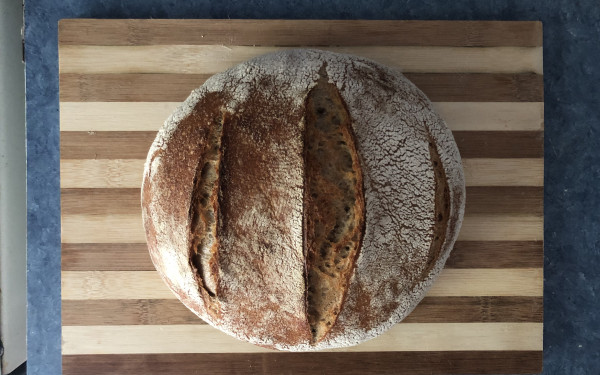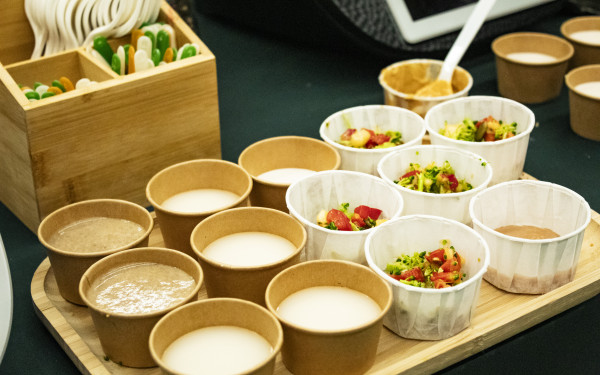Navigating a Culture of Good and Bad Food
Health Eating and Green Living Expo Brings Organic Producers Together
Tens of thousands of fanatical health foodies made their way to the Palais des Congrès this weekend ready to taste hundreds of natural food samples at the Expo Manger Santé et Vivre Vert.
This year marked the 18th edition of the expo, which is a food exhibition promoting health lifestyles that took place over the course of three days.
In addition to the local, gluten-free, organic, vegan and low carbon-footprint food items, there was no shortage of cosmetic and homeopathic products, not to mention spa and vegan restaurant displays. There were over 70 demos and conferences for participants to join, attend and to listen to.
“It’s about healthy foods, ecology, global health and connecting the buyer to the seller,” said Louise Nassif, the event’s communications manager.
This event, originated by Renee Frappier in 1997, allows the public to ask direct questions to the company producers and learn new things.
“Our mission is to bring awareness and help people improve their health,” Nassif continued.
In the early years, invitations were sent out, but now there’s a waiting list, and the organizers are forced to refuse people.
“We’re at a stage now where we don’t really need to find partners; they come to us,” Nassif said. “We won’t accept [exhibitions] with white sugar, palm oil or non-organic chocolate.”
From baking competitions and cooking demos, to teens meeting their favourite local chefs and bombarding Instagram with the hashtag TroisFoisParJour, the Palais des Congrès was overflowing with gastronomes.
Peak time hit around noon, which meant that it became impossible to walk more than two feet without bumping into three people at once.
Why has this event become so popular over the years? Has vegan food become tastier? Or are people more concerned with the foods they ingest moreso than they were a few decades ago?
When it first opened 18 years ago, the expo had roughly 12 000 attendees. This year, it’s grown to receive over 20 000 people, according to Nassif.
“Every year the number gets higher because we see that healthy eating is becoming more prominent in our society and people are taking their health into their own hands,” she said. “It is obviously something that is important for Quebecers.”
According to a 2008 study commissioned by Agriculture and Agri-Food, sales of certified organic products in Canada reached around $2 billion, with about 45 per cent of sales through mainstream supermarkets. Statistics Canada claims that since 2006, the organic food market value has more than tripled.
With a growing amount of people opting for alternative food options, eco-friendly organic food producers are selling their products to a wider array of supermarkets throughout the country than ever before. However an organic, vegan or gluten-free label does not necessarily guarantee a higher quality product or one of better nutritional value.
As far as health concerns go, only 1 per cent of the population suffers from celiac disease, and it’s still debated whether GMOs have negative health effects.
At the expo, companies displayed products ranging from plant-infused water-spray, to edible makeup and dairy-free ice cream. One company, Mon Épicier Bio, was present and giving out samples of local organic sausage.
“All the meat is organic, meaning the animals are eating a non-GMO diet containing no preservatives or additives, and the animals live a free-range life,” said Marie-France Lalonde, president of the company.
The Canadian Parliament’s website says there is very little research done on whether there are negative consequences from GMO products and that there’s no proof organic farming is any healthier.
On the other hand, there have been claims that organic foods contain more vitamins and have better taste. Although these statements are not yet proven,no question exists that organic products contain fewer harmful pesticides and chemicals. Still, how much is hard to say.
Another company, Zorah Biocosmetics, had a large area for people test their argon oil-based products.
“Would you eat your Clarins cream? I don’t think so,” said president Melissa Harvey. “You can eat my BB cream, mascara, everything, and it lasts.” Her local company sells products that are also gluten-free and not tested on animals.
La Brise Verte’s kiosk was selling bamboo toothbrushes and hand-made aluminum-free deodorant. A 45-gram jar, that contains what looked like jelly glue, sells for $12 in stores, and is the only deodorant in Canada with such a short list of ingredients.
Why buy a bamboo toothbrush? “A normal toothbrush is made from plastic which means it’s petroleum-based,” said co-owner Milene Larochelle. “Since this is biodegradable, you don’t have to recycle it, and you can simply dispose it in your garden.”
Whether people went to the expo in search of enlightenment or to skip lunch in favour of free organic chocolate and dairy-free pizza samples is debatable. Nevertheless, there is no ignoring the fact that Quebecers and Canadians alike are opting for more natural food and health products.
It may just be that expos like these are one of the tools that help spread knowledge. People are finding out they have options, and are increasingly choosing to avoid the possible risks involved in consuming biochemically-infused products, such as GMOs.

_600_832_s.png)


_600_375_90_s_c1.jpg)

